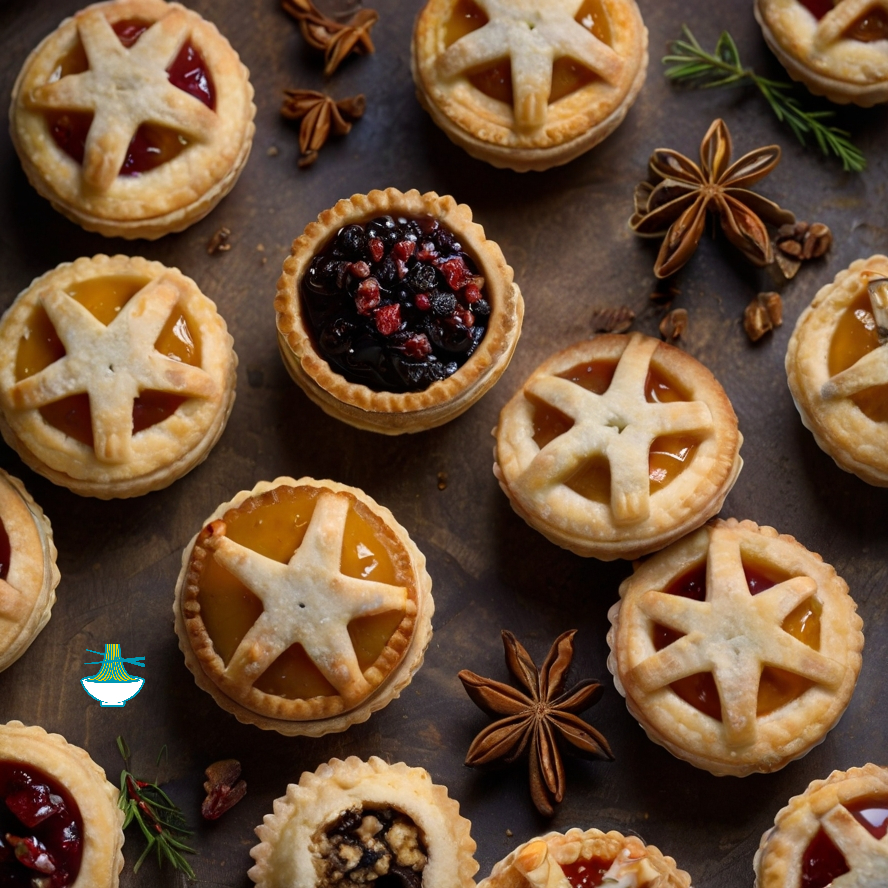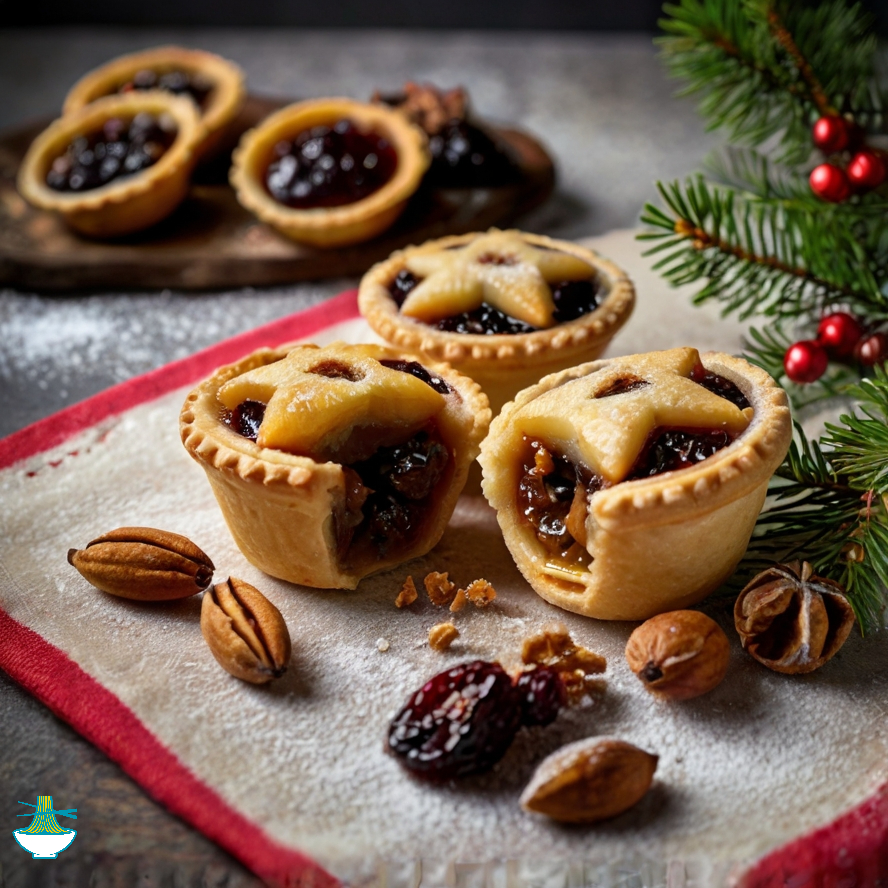The Traditional mince pie , a beloved holiday treat, is a small pastry filled with mincemeat—a rich mixture of dried fruits, spices, suet, and sometimes brandy.
Its origins trace back to medieval times when mince pies were filled with meat, spices, and fruit. Over time, the meat content decreased, and the sweet version we enjoy today emerged. This festive dessert is traditionally associated with Christmas in many English-speaking countries and is often enjoyed with a dollop of brandy butter or cream. Making mince pies involves preparing a sweet pastry dough, filling it with mincemeat, and baking until golden brown. It's a cherished tradition that brings warmth and nostalgia to holiday gatherings.
Ingredients:
- 2 cups all-purpose flour
- 1/2 cup unsalted butter, cold and diced
- 1/4 cup granulated sugar
- 1 egg, beaten
- 1 jar (about 400g) mincemeat
Method:
1. Preheat your oven to 200°C (400°F).
2. In a mixing bowl, combine the flour and diced butter. Use your fingertips to rub the butter into the flour until the mixture resembles breadcrumbs.
3. Stir in the sugar, then gradually add the beaten egg, mixing until the dough comes together.
4. Roll out the pastry on a floured surface to about 3mm thickness. Using a round cutter, cut out circles large enough to line a muffin tin.
5. Press the pastry circles into the muffin tin, then spoon a generous amount of mincemeat into each pastry case.
6. Roll out the remaining pastry and cut out smaller circles or shapes to create tops for the pies. Place these over the mincemeat filling, pressing the edges to seal.
7. Make a small slit in the top of each pie to allow steam to escape during baking.
8. Bake in the preheated oven for 15-20 minutes or until the pastry is golden brown.
9. Allow the mince pies to cool slightly before removing them from the tin. Serve warm with a dusting of powdered sugar or a dollop of whipped cream, if desired. Enjoy!
Nutrition Value:
1. All-Purpose Flour (2 cups):
- Calories: Approximately 800 kcal
- Carbohydrates: Approximately 170 grams
- Protein: Approximately 20 grams
- Fat: Approximately 2 grams
- Sodium: Minimal (depending on brand)
- Cholesterol: None
- Vitamins: Contains small amounts of B vitamins (thiamin, riboflavin, niacin)
- Minerals: Contains small amounts of iron and folate
- Nutritional Benefit: Provides energy from carbohydrates and a small amount of protein. Contains some B vitamins and minerals, particularly iron.
2. Unsalted Butter (1/2 cup):
- Calories: Approximately 800 kcal
- Carbohydrates: None
- Protein: None
- Fat: Approximately 90 grams
- Sodium: Minimal (depending on brand)
- Cholesterol: Approximately 240 mg
- Vitamins: Contains small amounts of vitamin A and vitamin D
- Minerals: Contains small amounts of calcium
- Nutritional Benefit: Rich source of fat, particularly saturated fat. Provides flavor, texture, and moisture to the pastry.
3. Granulated Sugar (1/4 cup):
- Calories: Approximately 200 kcal
- Carbohydrates: Approximately 50 grams
- Protein: None
- Fat: None
- Sodium: None
- Cholesterol: None
- Vitamins: None
- Minerals: None
- Nutritional Benefit: Provides sweetness and flavor. Source of quick energy from carbohydrates, but offers minimal nutritional value beyond calories.
4. Egg, beaten (1 egg):
- Calories: Approximately 70 kcal
- Carbohydrates: Approximately 0.5 grams
- Protein: Approximately 6 grams
- Fat: Approximately 5 grams
- Sodium: Approximately 70 mg
- Cholesterol: Approximately 185 mg
- Vitamins: Good source of vitamin B12, riboflavin, and selenium
- Minerals: Contains small amounts of iron and phosphorus
- Nutritional Benefit: Provides structure, moisture, and richness to the pastry. Good source of high-quality protein and essential vitamins and minerals.
5. Mincemeat (400g jar):
- Nutritional values may vary depending on the specific brand and recipe used. Generally, mincemeat contains:
- Calories: Approximately 800-1000 kcal
- Carbohydrates: Approximately 150-200 grams
- Protein: Approximately 5-10 grams
- Fat: Approximately 10-20 grams
- Sodium: Varies (depending on added salt)
- Cholesterol: Varies
- Vitamins: May contain small amounts of vitamin C from fruits like apples or citrus
- Minerals: May contain small amounts of potassium, calcium, and iron from dried fruits and spices
- Nutritional Benefit: Provides sweetness, flavor, and texture to the filling. Contains a mix of dried fruits, which can contribute some vitamins and minerals. The suet (if included) adds fat content to the filling.


Comments